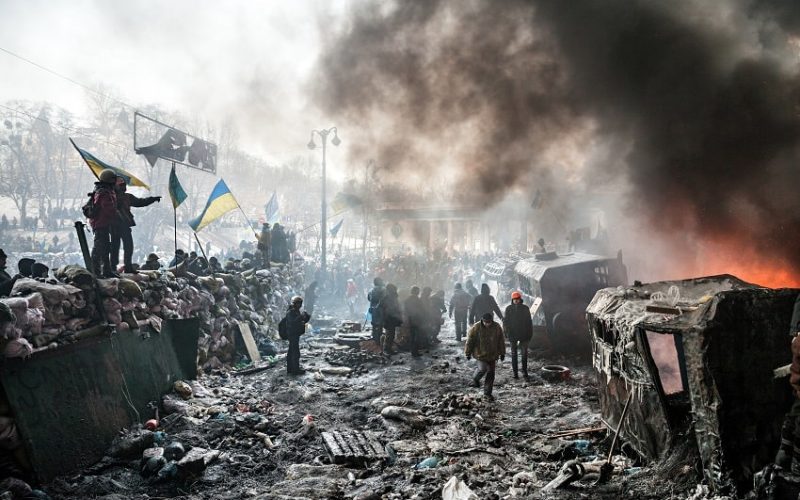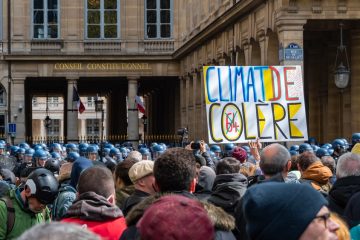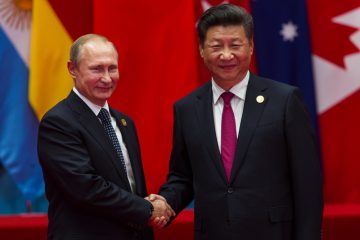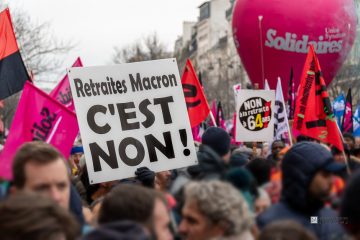Written by : Dr. Pratip Chattopadhyay
Photo : Shutterstock.com
Summary:
Russia has invaded Ukraine and it is the most devastating ‘war’ Europe has witnessed in recent times and this should be enough warning to the United States and NATO forces for further advancement towards the East. Russia has not unleashed a ‘war’ on Ukraine but has ‘warned’ the NATO and United States about possibility of serious ‘threat’ of war in case of unwanted approach towards Russia. These are two contrasting views that has covered the analytical discourse since Russia orchestered attacks in Ukraine from February 24th 2022. In between these two versions, a political economy approach seems to be most important joining the missing dots in them. The timing, span and inhumanness associated with the attack and consequent restraint from United States and NATO and ambiguous diplomatic move by India creates a situation whereby politics and economics gets mixed in the background of recovery period from Covid.
This intervention begins by highlighting the context of the crisis with a debate about the present crisis being Russian made or Ukraine and then the consequence of this crisis on world geopolitics and international politics in general. This piece concludes by arguing that neither it is a ‘war’ nor it is a ‘warning’, but it is a ploy to sustain the market of weapons and armaments by creating a maze of fear and consequent increase in defence expenditure than on social sector expenditure which was most likely in post-Covid period.
The Crisis: Russian made or Ukraine made?
Russia and Ukraine have a complicated history since 1992 when both countries became independent states following the dissolution of the USSR. As the more powerful state, Russia tried to shape Ukraine’s domestic politics and control its foreign policy. The last thing the Kremlin wants is a neighbour that aligns with NATO, the EU, or the West in general. Since 2004, when the former Soviet republics of Estonia, Latvia, and Lithuania joined NATO and the EU, the Russian government has made it clear that it would oppose any efforts to integrate any of the remaining post-Soviet states and this became a red line of sorts. Ukraine obviously has wanted to pursue an independent foreign policy and join the EU or NATO. But states that border more powerful states must also keep in mind the interests of a stronger neighbour.
In Eurasia region, only Ukraine and the three Baltic states (Estonia, Latvia, Lithuania) that achieved membership in both NATO and the European Union in 2004 have managed to stay beyond Moscow’s grip. Determined to reverse the entropy for which Putin blames Gorbachev, Putin believes in the transhistorical unity of Great Russia and hence the independent existence of Ukraine does not exist in Putin’s discourse. Autonomy equals disloyalty and those who seek it are seen as ‘Nazis’ by Putin. All the horrors that Putin is unleashing – the death, the lies, the violence the refugees- echoes the 1940s. Putin is driven by a perverse misreading of history to deny his neighbours humanity. The Kremlin and Putin have long deployed Russia values and Russian history as weapons in their conduct of information warfare, especially when it comes to Ukraine. For Putin, every aspect of the Ukraine conflict has been made personal. He has touted and invoked his own connections to Ukraine and Crimea at every possible opportunity. Every move has been on his timetable and every Russian official and commentator stresses that the ultimate decisions in Ukraine are up to him and a very small group in his inner circle who share his views.
In the summer of 2021, Putin published an essay laying out his interpretation of Ukrainian and Russian history: the two countries are one people, state and culture, and they share the same heritage and religion. This essay was in effect an elaboration on his March 2014 address marking the annexation of Crimea, and also on earlier statements and writings. Indeed, almost a decade ago, in 2013, Putin abruptly turned his focus toward Ukraine and its relations with Russia as he worked on shaping a new Russian national narrative. Putin’s new narrative rejected the West as a model and put Russia firmly on its own path. And the territory of post-Soviet Ukraine, including Crimea, played a key role in a series of events that Putin selected and spotlighted. Putin depicted Ukraine as Kievan or “holy” Rus’, the birthplace and antecedent of the Russian state. So there is logic of history, religion, ideology, geopolitics woven together in the Russian attack.
The flip side of the story is fault lines of Ukraine. The first explanation of the conflict is that it was the result of western expansion, which distorted the balance between the east and west. The war was a natural response to NATO and EU expansion. Certain realist thinkers like Mearsheimer John J. (2014) take the stance that “the United States and its European allies share most of the responsibility for the crisis.” Since it was obvious that Ukraine was a red line for Russia, the west should have avoided such an expansion that is clearly destabilizing the balance of power. The port of Sevastopol had been serving Russian interests for a long time, and Russia could not have risked losing it. Even though, Russia had a lease till 2042 on its naval base at the Crimean port of Sevastopol, in Realpolitik this was not a guarantee that one day Ukraine would not expel Russian Black Sea Fleet. As a result of Ukraine’s democratization and westernization, this port could have fallen into the hands of NATO. One can call this a ‘Hobbesian Fear’. In this view, Russia as a great power did what it had to do. Furthermore, Ukraine joining NATO meant that Russia would share a threateningly long border with an institution that it deems to be concerning for its security.
It is well known that Russia was not so happy with the instalments of the missile defence system in its neighbourhood; it was also not so content with the expansion of western institutions to that area. The West knew this, as the liberal perspective suggests, however they ignored that and proceeded with what was the opposite of Russia’s demands. The war in Ukraine, therefore, could be explained by the West’s inability to grasp the measures Russia would take if they proceeded with violating Russia’s demands. The war in Ukraine, therefore, could be explained by the west’s inability to grasp the measures Russia would take if they proceeded with violating Russia’s demands. Constructivism argues that since the Russian Empire, this nation was a great power, it had a security belt around it, and it always aspired to expand its territory in the name of pan-Slavism, communism, or recently Eurasianism. The history, the people and the elites, and their identities were the determinants of Russia’s actions. And this identity is characterized as being nationalist, militarist, adventurist and expansionist. So from international relations theoretical perspective it can be said that Ukraine’s eagerness to be close towards West than Russia tempted Russia to put Ukraine in ‘chains’.
The Context : A War Game
Putin and his conglomerates in Moscow with their own reading of history is a modern problem requiring modern solution which means decoding the war-hysteria that has cropped up. Putin has long abandoned socialist imagery and embraced imperialist tendencies that refkected in his annexation of Crimeia in 2008 and then supporting separatist forces in Eastern Ukraine from 2014. Putin has created what is called kleptocracy, a regime where logic of nationalism and patriotism guards the ultimate motive of grabbing land and wealth of their own citizen to their use. Such kleptocrats have their allies in the West in the form of pressure group lobbies and media lobbies to mellow down any critical steps against them. The faint reaction from United States and NATO forces testify such an argument during Ukraine crisis. Russia’s open bid to China to help out its army in Ukraine also testify that despite being second in military and defence in the world, the army has not been experienced enough too break civilian resistances as in Ukraine.
Even after repeated sanctions on Russia, the prolonged and relaxed way in which Russian troops devastated strategic points in Ukraine shows that Moscow was sure that its lobbies in United States would weigh down such sanctions in near future. China abstained from voting against Russia in all the motions against Russia raised in United Nations including the one of human rights violence. China found allies in such behaviour in India and Pakistan.
India’s position has been unique Putin, Xi, Modi all represent muscular foreign policy discourses. Modi domestically calls for Nehru-mukt and Congress-mukt Bharat (meaning India without the legacy of Congress and Nehru) but is shamelessly following a nonalignment position in a crucial point in world politics when human rights violation is at its peak. India went ahead in purchasing crude oil from Russia at a time when Russia is in dire need of finance to continue its attacks in Ukraine. Going against the tide of world public and political opinion, India’s demonstrative closeness to Russia when Russia is showing peak of imperialist tendency can only be appreciated by a failed state like Pakistan, India’s foreign policy mandarins seems to be clueless which way to go, against China they are going with United States and against world opinion they are going with Russia. This is exemplary of dependent foreign policy as nonalignment foreign policy in present time would require India to make a united front of all developing countries and uncompromisingly stand firm against any imperialist and unilateral aggressions be it done by Russia, United States or even China. But one must also seriously view Ukraine’s position, Ukraine today is clamaouring for all type of interventions to save the country against Russian aggression but Ukraine supported Israel when Israel made similar aggression against Philistine.
Today Ukraine along with United States are shouting Russian aggression but the same model is followed by Israel it is seen as right to defend its own security problems. Ukraine was also a party to similar arguments, So the question is how serious the parties involved in this ‘war’? Russia seemed relax, Ukraine is hoping to have some reconstruction package from Europe and United States once ceasefire is declared, United States and Europe seemed to be least bothered with this crisis. In such a context this presents as a classic case of ‘game of war’ where the timing of action and timing of ceasefire happens in mutually convenient time. So many medical students came back to India midway of their courses, so many people became homeless and refugees but no one seem to be bothered and act to stop Russian act further. Actually all parties involved knows that the timing of action was just after Covid and timing of ceasefire will be just before another variant of Covid comes up. So Russia-Ukraine crisis is a lull between two points of medical marketing of corporate driven vaccines where arms selling business is given a fillip.
The Consequence: From World Politics to Zonal Politics?
Are nation-states not becoming bothered abut happenings far away from their backyard? This is exactly what the present Russian-Ukraine crisis reflects. Even if signs of such was evident during Sino-Indian conflict at Dokhlam in 2017 and Ladakh in 2021 but Uthere were call of mediations particularly from United States which neither China nor India paid heed to, Interesting to nte is that United States or any other important powers from Europe and Asia have called on the role of mediator between Ukraine and Russia, It is done y Belarus a country in the neighbourhood f the conflict zone. So it can be deduced that a trend is developing whereby nation-states are shrinking to its own zone rather than spreading globally. After effect of Covid? May be the prolonged non-connectedness and shrinking to own backyard during Covid had left a mark in international politics whereby in coming years any crisis situation in any conflict zones in the world will have to be managed by that specific zonal country and not by distant powers. Russia-Ukraine crisis seems to lead international relations to such a consequential state of affairs.
(The views expressed in this article are the author’s own and do not necessarily reflect Multidimension’s editorial stance.)
Read More :
From Kabul to Quad: In Which Way World Politics is Heading?
About the author :
Pratip Chattopadhyay
Assistant Professor, Department of Political Science, University of Kalyani, West Bengal, India




